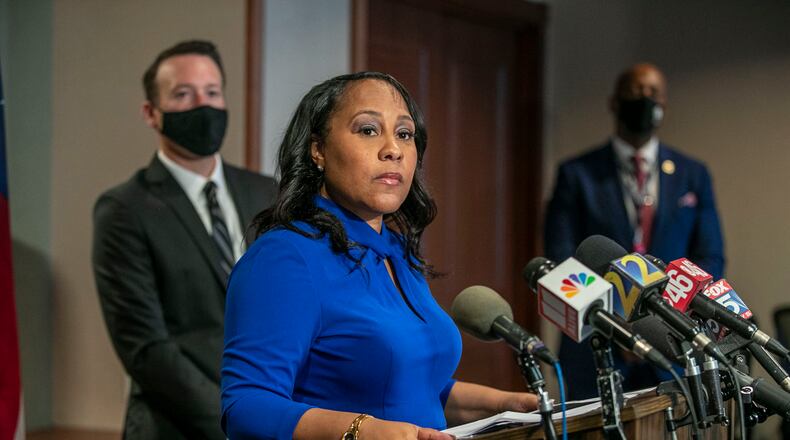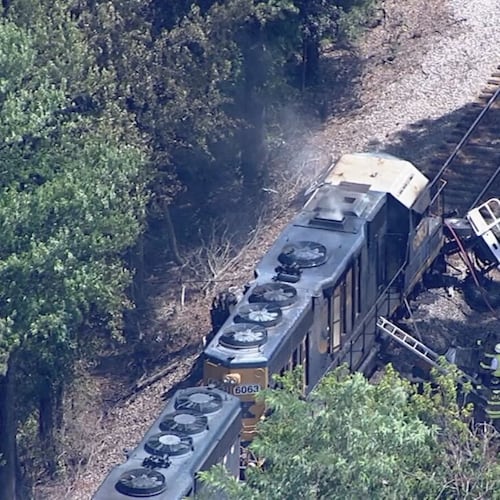Fulton County District Attorney Fani Willis is requesting a special grand jury to aid in her investigation of former President Donald Trump and his efforts to overturn Georgia’s 2020 election results.
In a Thursday letter to Christopher S. Brasher, chief judge of Fulton County’s Superior Court, Willis said the move was needed because a “significant number of witnesses and prospective witnesses have refused to cooperate with the investigation absent a subpoena requiring their testimony.”
She cited comments Secretary of State Brad Raffensperger made during an October 2021 interview with NBC News, in which he said “if (Willis) wants to interview me, there’s a process for that.”
So-called special purpose grand juries are rarely used in Georgia. But they could be a valuable tool for Willis as she takes the extraordinary step of investigating the conduct of a president while he was in office, legal experts say.
“I think it makes sense,” said Melissa Redmon, a former Fulton County deputy DA who’s now an assistant clinical professor at the University of Georgia’s law school. “Having a jury that’s already familiar with the investigation just saves everyone a lot of time.”
Willis’ probe, launched in February, is centered on the Jan. 2 phone call Trump placed to Raffensperger, in which he urged the Republican to “find” the 11,780 votes to reverse Joe Biden’s win in Georgia in November 2020. But it could also include other actions from Trump’s allies who sowed doubts about the election results, including testimony his attorney Rudy Giuliani gave at a state legislative hearing.
In her letter to Brasher, Willis said the DA’s office “has received information indicating a reasonable probability that the State of Georgia’s administration of elections in 2020, including the State’s election of the President of the United States, was subject to possible criminal disruptions.”
Special grand juries, which typically have 16 to 23 members, can’t issue indictments. But they can subpoena witnesses, compel the production of documents and information, and enter into certain offices for the purposes of an investigation.
They were previously used to investigate several metro Atlanta politicians for public corruption, including former Gwinnett County Commissioner Kevin Kenerly, ex-Clayton Sheriff Victor Hill and ex-DeKalb CEO Burrell Ellis.
Willis said a special grand jury would be beneficial for the Trump probe because jurors can be impaneled for as long as prosecutors need, would be focused on the one investigation and have “an investigatory focus appropriate to the complexity of the facts and circumstances involved.”
A regular Fulton County grand jury is seated for two months. Jurors typically hear hundreds of felony cases before their service ends.
The DA also requested that a Fulton County superior court judge be assigned to assist and supervise the special grand jury in carrying out its investigation and duties.
Willis’ request must be approved by a majority of the county’s superior court judges.
Trump on Thursday defended his phone call to Raffensperger before echoing previous false statements about widespread voter fraud.
“What this Civil Special Grand Jury should be looking into is not my perfect phone call, but the large scale voter fraud that took place in Georgia,” Trump said in a statement released by his leadership political action committee.
In an interview Thursday on Fox News, Raffensperger said his office had been cooperating with prosecutors.
“Any information that they’ve requested, we sent it to them. And if we’re compelled to come before a grand jury, obviously, we will follow the law and come before a grand jury and testify,” he said.
Raffensperger, a Republican, also accused the Democrat of “slow walking” the inquiry.
”I think she’s just trying to score some cheap political points with her Democrat friends,” he said.
The developments arrive as Fulton prosecutors continue to work their way through a backlog of some 11,000 criminal cases created by the pandemic and, as Willis has alleged, mismanagement by her predecessor Paul Howard.
Some critics believe Willis should focus on clearing those cases rather than devoting limited resources to probing the notoriously litigious former president.
To move forward with charges, prosecutors would need to prove that Trump knew his conduct was unlawful when he called Raffensperger.
While some legal experts believe the criminal intent, or mens rea, is there, other defense attorneys argue the case isn’t so cut and dried.
Willis recently told The Associated Press that a decision on whether to bring charges against Trump could come in the first half of 2022.
“We’re going to just get the facts, get the law, be very methodical, very patient and, in some extent, unemotional about this quest for justice,” she told the wire service earlier this month.
Trump is also facing a pair of investigations in New York: a criminal probe examining his financial dealings led by the Manhattan DA and a civil fraud investigation overseen by state Attorney General Letitia James.
Meanwhile, a committee on Capitol Hill is looking into Trump’s behavior in the leadup to the Jan. 6 insurrection. Willis’ office is sharing information with the panel.
About the Author
The Latest
Featured


